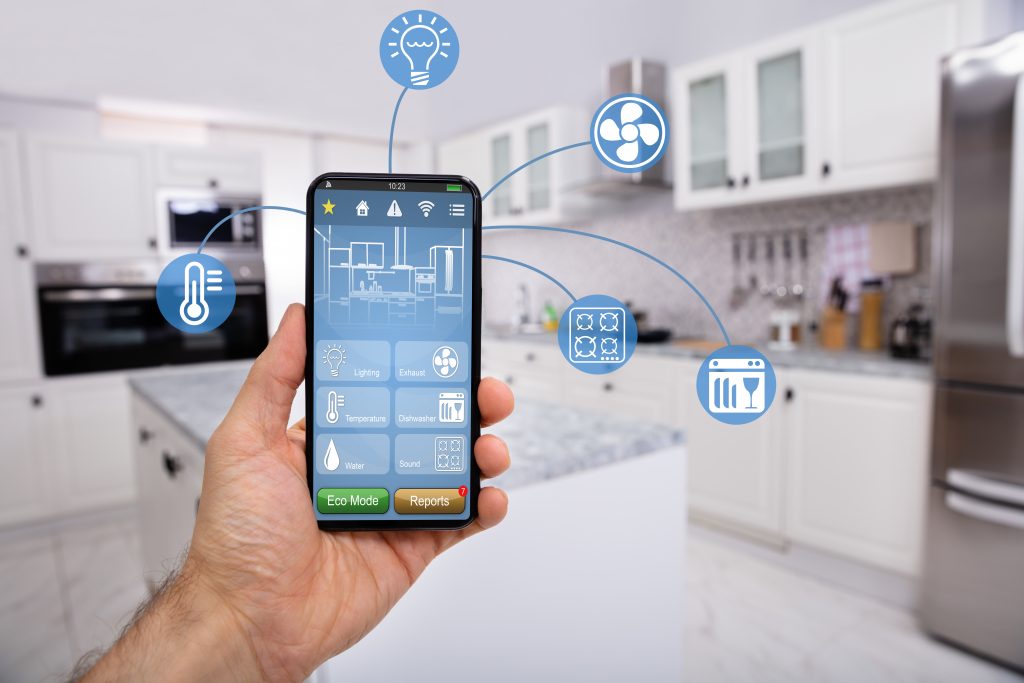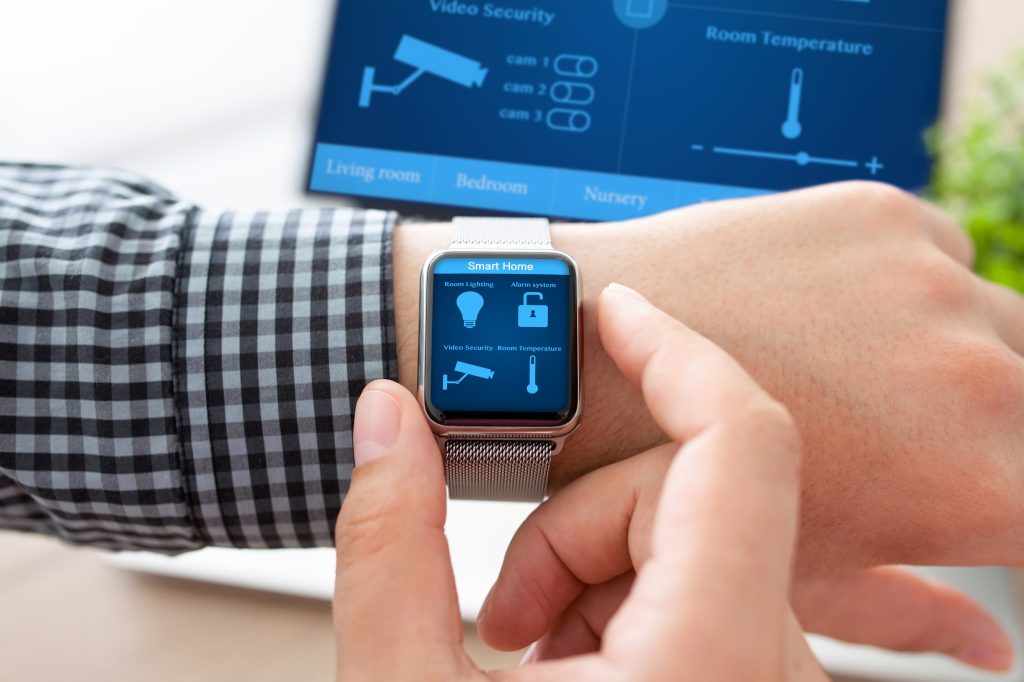Options for high-tech home updates are
endless — and improving
It’s 10 o’clock at night. My son is sleeping in his crib upstairs, and my husband has fallen asleep in the recliner. I remember I left my workout gear in the car, so I unlock my car from inside the house using the key fob, put the keys back in the bowl, and head out the door. On my way back in, I find that the garage door locked behind me. All other doors to the house are locked, and the spare key is missing. Luckily, I have my cell phone. I call my husband to let me back in. He keeps his phone on silent, but I’m optimistic. No answer. Not only am I locked out, but we haven’t turned on the outside security lights for the night, so I’m completely in the dark.
That night I decided it was time for some high-tech updates to our not-so-smart-home.
When building a new home, homeowners are making smart home technology a top priority. According to local high-end custom home builders, like Rob Purvis of Purvis Builders, “People want and expect certain home technologies in their new homes. Security, lighting and thermostat control, home audio, and entertainment systems are among the most popular I’ve seen in recent projects.” In new construction, “It benefits everyone involved to have a game plan before the house is built,” he says. “When the house plans are near completion is is the best time to figure out what technology is right for you and where in the home you want it.”

But what about existing homes? My husband and I live in a basement rancher built in the early 70s, so smart home technology wasn’t exactly factored into the design of the house, though we had a wicked faux wood stereo and intercom system throughout the house, until it died.
I started to research different products on the market and realized there were two big decisions to make first: did we want something my husband and I could install ourselves, or did we want a professional to install everything for us? Saving some money is always appealing but technology integration can be tricky and we, like most busy working parents, just don’t have time for hours of tech support phone calls when something goes wrong. As non-professionals we would most likely have to select from among various brands for each specific product that would potentially be on different platforms, such as Amazon, Google, Samsung, or Apple, having to depend on these to play nicely together while shuffling through multiple apps to control each device. Again, that sounds like lots of frustration if there is a problem. We concluded that everything should be on one platform, one app, that worked on any of our digital devices, and to get that the best answer is to find a local expert that can handle it all.
Speaking with local experts confirmed the potential nightmare of DIY home automation. These do-it-yourself products run through your home’s Wi-Fi network, requiring a very dependable internet connection. They are designed to be controlled through your cell phone, tablet, or computer, not by a professional monitoring company. We had hoped that installing automation would increase the value of our home, but we learned there is a catch. “When someone has these DIY products installed in a home,” explains Christine Dean of HIS Security & Technology, “it can be difficult to transfer them to a new homeowner. Security becomes an issue. How are you going to lock out someone who had access to these products before you bought the house?” If the home is controlled and monitored by a professional company, “the previous homeowner’s information is stripped from the system and is assigned to the new homeowner. This can be harder to do with a DIY smart home versus a smart home that is professionally monitored,” she says.

The difference between products such as Ring, SimpliSafe, or Google Nest and products offered by companies like locally owned HIS Security & Technology or Advanced Security Systems is that the products offered by these local companies are not always dependent on Wi-Fi. They can communicate through the equivalent of a cellular text. This allows for a more secure and less vulnerable system. Security professionals often partner with the Alarm.com platform, and all of the products they specify have been vetted for security purposes before ever going into a client’s home. The vetting process ensures security from malware and account-hijacking or identity theft. If you already have smart devices you want to continue to use, “we can integrate some of these devices with our program. For example, you can talk to Alexa to tell Alarm.com to turn on the lights.” says Christine.
Jeremy Scurlock of Advanced Security, another top end local company, agrees. “We can provide you with both a landline and cellular connectivity in the event of a power outage so it works during inclement weather.” Advanced also offers assistance with whole house audio-visual equipment. “These modern systems enable you to control all of your music in every room from your smart phone, making it much more enjoyable to actually use the technology.”
Professional installation and the ability to monitor your devices for you give homeowners peace of mind. If there is an issue that arises with a product, most all local companies offer support team members that will troubleshoot it from the backend and assist by phone from a local office, rather than from somewhere across the world. If the issue persists, a local representative will come to your home to make necessary repairs. In a crisis situation, it can be difficult for a homeowner to communicate clearly with emergency personnel. Monitoring companies have professionally trained employees who will call local authorities on your behalf to notify them of a situation.
What exactly makes a home a Smart Home?
Homes on the market have begun to boast ‘smart home’ capabilities in order to boost sales and pricing. However, just because one has Alexa controlling the kitchen lights does not make a home smart. There is really no limit to the automation available for modern homes. Jeremy suggests “if you are building a new home have your security/automation contractor review the plans before the construction starts. Often we can make suggestions that will keep the automation aspect of the project within its budget.”
In order to create a standard in the real estate industry, Coldwell Banker Real Estate teamed up with CNET, a technology news and review website, to define a smart home: “The home must have a smart security feature or a smart temperature feature in addition to a reliable internet connection. It then must include at least two features from a list of smart options, including appliances, entertainment, lighting, outdoor sensors, and safety detectors.”

Now the question is, why a smart home?
Besides the well-known characteristics of smart home devices, such as controlling your thermostat, changing the volume of your Throwback Thursday Playlist and knowing who is at your front door before they even know they’re there, smart home capabilities and innovations are launching every year with new and improved features. Christine described a situation that really hit close to home where someone left their grill on. “It burned their porch and almost all of their house. I couldn’t help but think, if only they had the Grill Guard!” She explains this device lets you know if you have left the grill on, avoiding disasters like this.
Devices can be placed on chairs, beds, or doors of elderly loved ones or those with special needs, notifying a caregiver if someone is not getting up, getting up more frequently than usual, getting out of the house in the middle of the night, or even leaving the house as usual but forgetting to turn on the alarm system – then turning it on for them. “Alarm.com subscribers get notices via text or email when unusual activity occurs, like a door being opened in the middle of the night or no movement in the house during the daytime, says Jeremy.
Another good reason to make one’s home smarter is that some home insurance companies are starting to recognize the benefit of smart home technology. These companies are beginning to offer special discounts, rebates, and deals for homeowners who have installed smart devices in their homes. Typical qualifying devices are those that detect water, improve energy efficiency, and increase the home’s overall safety.
No matter what you choose, to do-it-yourself or have a professional team monitor your home, there are endless options to make your home smarter. Just remember that smart home devices are meant to help simplify the management of your home, not make it harder. Make a list of priorities, needs and wants, and start from there. Research before you buy and ask questions if needed. Know that products will improve, so be sure you consider devices that are able to be upgraded without having to purchase completely new each time. And remember – wireless does not mean there won’t be a power cord.
It’s 10 o’clock at night. My son is sleeping in his crib upstairs, and my husband has fallen asleep in the recliner. I remember I left my workout gear in the car, so I unlock my car from inside using the key fob, put the keys back in the bowl, and head out the door. On my way back in, I find that the garage door locked behind me. Luckily, I have my cell phone, no sweat. I pull up my security system’s app, turn on the outside light with one tap of my finger, and then unlock the garage door with one more tap. I’m back inside before my husband has even snored himself awake.
